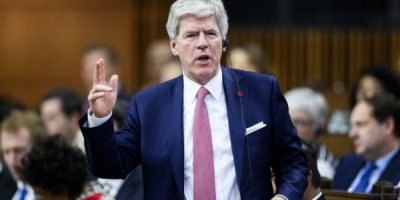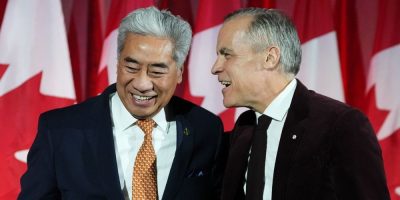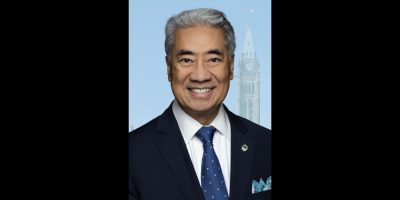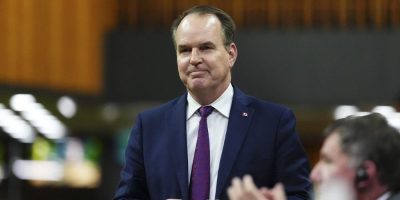Prime Minister Justin Trudeau says that incoming U.S. president Donald Trump is trying to distract from how costly his tariffs will be for American consumers by talking about making Canada the 51st state.
Trudeau made the comments in an interview on CNN late Thursday while in Washington, where he attended the funeral for the late U.S. president Jimmy Carter. He did not meet with Trump during his trip south of the border.
“(President-elect) Trump, who's a very skilful negotiator, is getting people to be somewhat distracted by that conversation, to take away from the conversation around 25 per cent tariffs on oil and gas and electricity and steel and aluminum and lumber and concrete,” Trudeau said.
"Everything the American consumers buy from Canada is suddenly going to get a lot more expensive if he moves forward on these tariffs.”
Trump has threatened to slap 25 per cent tariffs on imports immediately after he gets into office. Trudeau confirmed Canada will respond with retaliatory measures, just as it did in 2018.
Trudeau declined to outline the specifics of Canada's response. A senior government official confirms Ottawa is looking to target American steel, ceramics, plastics and orange juice with retaliatory tariffs.
The official said Ottawa has made no decisions yet on retaliation and is not prepared to share the full draft list of items it's considering for retaliatory tariffs.
Barrie's News Delivered To Your Inbox
By submitting this form, you are consenting to receive marketing emails from: Central Ontario Broadcasting, 431 Huronia Rd, Barrie, Ontario, CA, https://www.cobroadcasting.com. You can revoke your consent to receive emails at any time by using the SafeUnsubscribe® link, found at the bottom of every email. Emails are serviced by Constant Contact
The selective release of certain retaliation plans comes just a week and a half before Trump's inauguration. Trudeau and the premiers are set to meet in Ottawa next Wednesday to discuss Canada's response plan, including retaliatory tariffs.
Conservative Leader Pierre Poilievre said at a news conference in Ottawa Thursday that Canada should not consider making oil and gas part of its retaliatory response.
"The reality is putting Canadian tariffs on American energy wouldn't do very much because they buy a hell of a lot more oil and gas from us than we do from them," he said.
Experts said that while Canada is right to signal that it's prepared for a fight, it would lose a wider trade war and risk escalation if Ottawa threatened similar across-the-board tariffs.
Laura Dawson, a trade expert and executive director of the Future Borders Coalition, said Canada has a lot of economic exposure and tariffs are ultimately paid by consumers and importers.
"By leaking or sharing or hinting about what's on the list, it's trying to signal to the White House that Donald Trump's tariffs will be costliest to Americans," she said.
CBC News first reported this week that a draft list of potential tariff targets was circulating among a small group of top officials in Prime Minister Justin Trudeau's government - one that includes orange juice from Florida.
"The strategy that trade officials take when devising these retaliation lists is that you want to find products that are iconic, that will be recognizable," Dawson said.
"That's why they pick things like orange juice because it's something that people can easily understand, and it's something that's localized to a region that Trump cares a great deal about, and that's Florida voters."
But she also said Canada can't slap tariffs on items with surgical precision, since it's done by product categories. Ottawa can levy tariffs on orange juice, but not something so specific as Minute Maid products or orange juice from Florida - not without also hiking prices on juice from California and other states.
Matthew Holmes, executive vice president at the Canadian Chamber of Commerce, said floating targeted items is a better move than making a blanket threat of across-the-board tariffs, which could invite escalation and kick off a trade war Canada couldn't win.
"You never want to get into a full competition with the U.S. Treasury," he said. "The scope and scale of their market, their depth of internal trade is a very different economy than the one Canada has, which is premised largely on import/export trade. We're not going to win if it's a pure war of attrition."
When asked to respond to Canada preparing its retaliatory tariff list, the Trump team said the tariffs are in the best interest of U.S. consumers.
“President Trump has promised tariff policies that protect working Americans from the unfair practices of foreign companies and foreign markets," said Brian Hughes, a spokesperson for the Trump-Vance transition team.
"As he did in his first term, he will implement economic and trade policies to make life affordable and more prosperous for our nation, while simultaneously levelling the playing field for American manufacturers.”
Canada announced in December a $1.3-billion plan to beef up border security in response to Trump's tariff threats, but that has not deterred Trump, who doubled down on his rhetoric this week.
Canada fought back against U.S. steel and aluminum tariffs during Trump's first term by targeting specific American products like playing cards, ketchup, and bourbon to put political pressure on Trump and key Republicans.
Holmes said Canada needs to present Trump's tariff threat as a "tax on everyday Americans" and target specific supply chains or states that will be critical to Trump in the midterm elections in two years.
But the midterms, set for November 2026, also give Trump a long runway. The U.S. is still bearing some of the costs of tariffs from Trump's first term, such as those levied on Chinese imports which President Joe Biden didn't remove.
"They can go deep, they can go long. It's really how much the American consumer is willing to tolerate in terms of the affordability prices they're facing because this will up costs," Holmes said.





